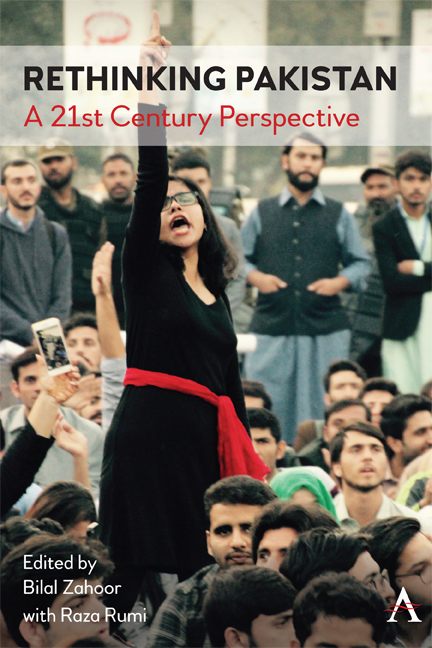Book contents
- Frontmatter
- Dedicated
- Contents
- Acknowledgements
- Introduction
- Part I Identity, Religion and Radicalisation
- Part II Development, Reform and Governance
- Part III Rights, Repression and Resistance
- Part IV Sex, Gender and Emancipation
- Part V Conflict, Diplomacy and Foreign Policy
- Contributors
- Bibliography
- Index
Chapter 2 - Unpacking the Myth of Barelvi Eclecticism: A Historical Appraisal
Published online by Cambridge University Press: 20 January 2022
- Frontmatter
- Dedicated
- Contents
- Acknowledgements
- Introduction
- Part I Identity, Religion and Radicalisation
- Part II Development, Reform and Governance
- Part III Rights, Repression and Resistance
- Part IV Sex, Gender and Emancipation
- Part V Conflict, Diplomacy and Foreign Policy
- Contributors
- Bibliography
- Index
Summary
Generally, the creation of Pakistan is attributed to the political struggle launched by the All India Muslim League under the leadership of Quaid-e-Azam Muhammad Ali Jinnah (1876–1948). Among serious academics, Muslim League and Quaid-e-Azam both represented Muslim modernism, inaugurated by the Aligarh Movement during the second half of the nineteenth century. Sir Syed Ahmed Khan (1817–1898) was the harbinger of Muslim modernism which was largely anchored in changed circumstances wrought by the colonial modernity. I have argued in some of my write-ups that soon after Pakistan's establishment, its foundational story was rescripted in the light of fundamentalist ideology which contravened in a big way the very essence of Muslim modernism. The waning space for Sir Syed Ahmed Khan in our national narrative provides testimony to the creeping influence of exclusionary and fundamentalist streak drawn from religion.
Books like Ulema in Politics (1985) by Prof. Ishtiaq Hussain Qureshi have specifically highlighted the role of such clerics, who were steeped in literalist interpretation of religion. Qureshi's book identifies those individuals from among the Deobandi clerics who were positively disposed towards the idea of a separate state for the Muslims of the subcontinent. By doing so, Qureshi tried to put to rest the narrative insinuating Deobandis (like Jamiat Ulema-e-Hind and Majlis-i-Ahrar) as anti-Pakistan. Thus, the political instrument of Muslim separatism, as projected in our national narrative, has either been the Muslim modernists or the literalist ulema like Shabbir Ahmed Usmani, Mufti Muhammad Shafi and Zafar Ahmad Ansari. Subsequent to the secession of East Pakistan, Maulana Maududi too was added to the coterie of such people. From 1949 onwards, these clerics started asserting themselves, the impact of which resonates to this day.
What remains to be properly investigated, even to this day, is the role of supposedly more “eclectic” and “inclusive” section of the ulema with Sufi overtones in an extremely complex process of securing a separate state for the Muslims of North India. In this particular regard, Mujib Ahmad's work Jamiyyat Ulama-i-Pakistan: 1948–1979 is a commendable effort, which sheds light on the role of such section of the Sunni ulema in the earlier part of his book; however, far more research is required to properly bring their contribution into a scholarly focus. Ahmad does not deal with the Sufis per se.
- Type
- Chapter
- Information
- Rethinking PakistanA 21st Century Perspective, pp. 29 - 40Publisher: Anthem PressPrint publication year: 2020



